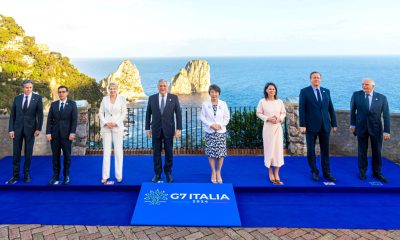tSín
Stallaí déileála infheistíochta AE-na Síne

European Commission Executive Vice President Valdis Dombrovskis confirms that progress on the investment deal with China has stalled following March sanctions.
The EU concluded what Dombrovskis describes as an “asymmetric deal” with China at the end of last year. Known as the Comprehensive Agreement on Investment (CAI), it was presented on 30 December.
Today (5 May) he said: ”There are substantially more new commitments from China as regards market access, with regards to the level playing field and this is something that European companies have been asking us for for many years. So as regards the agreement itself, that technical work is ongoing to prepare the ground for ratification.”
At the time of the agreement Dombrovskis said: “This deal will give European businesses a major boost in one of the world's biggest and fastest-growing markets, helping them to operate and compete in China. It also anchors our values-based trade agenda with one of our largest trading partners. We have secured binding commitments on the environment, climate change and combatting forced labour. We will engage closely with China to ensure that all commitments are honoured fully.”
Wider political context
When asked about whether the deal had been suspended, Dombrovskis said that the position of the European Commission has not changed. He said that the “ratification process of comprehensive agreement on investment cannot be separated from the wider political context. I will repeat that the ratification process cannot be separated from evolving dynamics of the wider EU-China relationship. And in this context, Chinese sanctions targeting among others members of European Parliament and even an entire parliamentary subcommittee are unacceptable and regrettable, and prospects and next steps concerning ratification on comprehensive agreement of investment will depend on how the situation evolves.”
The Commission faced much criticism when the agreement was reached, by appearing to move ahead of the United States, before the new administration had taken office. It was felt by some that the EU should wait to see if there was the possibility of finding common cause with the new Biden team.
There were also accusations that the EU was ignoring China’s human rights record, particularly in relation to the treatment of the Uyghur muslim population in Xianjang province and the crackdown on the democracy protesters and the introduction of the national security law in Hong Kong.
Comhroinn an t-alt seo:
-

 TobacLá ó shin 4
TobacLá ó shin 4Cén fáth nach bhfuil beartas an AE maidir le rialú tobac ag obair
-

 An tSín-AELá ó shin 5
An tSín-AELá ó shin 5Bígí le Lámha chun Pobal Todhchaí Comhroinnte a Thógáil agus Todhchaí Níos Gile a Chruthú don Chomhpháirtíocht Uile-Bhabhta idir an tSín agus an Bheilg um Chomhoibriú Cairdiúil le Chéile
-

 An Coimisiún EorpachLá ó shin 5
An Coimisiún EorpachLá ó shin 5Ní thairgtear saorghluaiseacht iomlán don RA do mhic léinn agus d’oibrithe óga
-

 An Mean OirthearLá ó shin 4
An Mean OirthearLá ó shin 4Tagann freagairt an AE ar stailc diúracán Iosrael ar an Iaráin le rabhadh ar Gaza






















